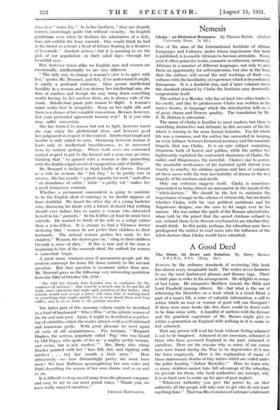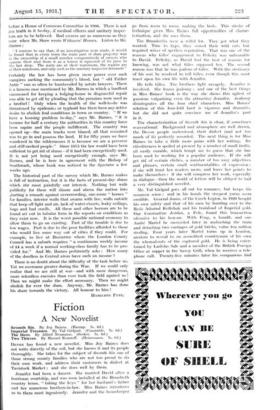A Good Deed
The Slum, its Story and Solution. By Harry Barnes, F.R.I.B.A., F.S.I. (King. 18s.) JUDGED by the ordinary standards of reviewing, this book has almost every imaginable fault. The writer never hesitates to use the most hackneyed phrases and literary tags. There is little plan or order in his arrangement. He delights in scraps of bad Latin. He misquotes Matthew Arnold, the Bible and Lord Passfield (among others). He—but what is the use of rehearsing the blemishes on a book which is a Good Deed, a part of a man's life, a mine of valuable information, a call to action which no man or woman of good will can disregard ? If there were more books like this there would be fewer evils to be done away with. A handful of authors with the fervour and the practical experience of Mr. Barnes might give us within a generation an England with nothing in it to make us feel ashamed.
That any person will read his book without feeling ashamed is not to be imagined. Ashamed of our ancestors, ashamed of those who have governed England in the past, ashamed of ourselves. Here arc the reasons why so many of our young men were found during the War to be degenerates (C 3 was the term employed). Here is the explanation of many of those unnecessary deaths of tiny babies which are veiled under the polite heading "Infant Mortality." Here we learn why so many children cannot take full advantage of the schooling we provide for them, why local authorities are corrupt, why it is so hard now to make up for ages of past neglect.
"Whatever authority you give the power to, on that authority all the people will take care to get who do not want anything done." That wasMiss Constance Cochrane's statement
Lefore a House of Commons Committee in 1906. There is not less truth in it to-day, if medical officers and sanitary inspec- tors are to be believed. Bad owners are as numerous as they were when Mr. Shaw wrote Widowers' Houses. Listen to Mr. l3arnes "I venture to say that, if an investigation were made, it would be found that in every town the main part of slum property was in the ownership of a small number comparatively of owners who squeeze their rent from it as a lemon is squeezed of its juice to the last drop. The rents are at their maximum, the repairs are at their minimum, and only such as the sanitary inspector demands."
Certainly the law has been given more power over such vampires sucking the community's blood, but " old Father Antic" can so often be bamboozled by astute lawyers. There is a famous case mentioned by Mr. Barnes in which a landlord summoned for keeping a lodging-house in disgraceful repair was able to get off by pleading that the premises were used as a brothel ! Only when the health of the well-to-do was threatened by epidemics or typhoid has there been any active
desire to abolish foul conditions in town or country. If We have a housing problem to-day," says Mr. Barnes, "it is because for half a century the authorities in this country have been supine and the people indifferent. The country was opened up—the main tracks were blazed, all that remained was to go in and possess the land. If for fifty years we have wandered in the wildernesses it is because we are a perverse and stiff-necked people." Since 1875 the law would have been sufficient to get rid of slums—if it had been energetically used. It is not yet being used energetically enough, says Mr. Barnes, and he is here in agreement with the Bishop of Southwark, whose book was noticed in the Spectator a few weeks ago.
The historical part of the survey which Mr. Barnes makes is full of instruction, but it is the facts of present-day slums which stir most painfully our interest. Nothing but wide publicity for these will shame and alarm the nation into starting a crusade against overcrowding, one-room " homes" for families, interior walls that swarm with lice, walls outside that keep off light and air, lack of water-closets, leaky ceilings, bugs and bad smells. All these and other horrors are to be found set out in tabular form in the reports on conditions as they exist now. It is the worst possible national economy to allow them to go on existing. Part of the trouble is due to low wages. Part is due to the poor facilities afforded to those who would live some way out of cities if they could. For example, to live at Becontree where the London County Council has a suburb requires "a continuous weekly income of £4 a week if a normal working-class family has to be pro- vided for." And Mr. Barnes pertinently asks : How many of the dwellers in Central areas have such an income ?
There is no doubt about the difficulty of the task before us.
Yet we overcame greater during the War. If we could only realize that we are still at war—and with more dangerous, more relentless enemies than ever took the field against us ! Then we might make the effort necessary. Then we might abolish for ever the slum. Anyway, Mr. Barnes has done his share towards the victory. All honour to him !
HAMILTON FYFE.































 Previous page
Previous page